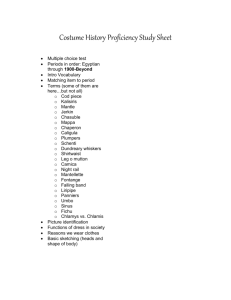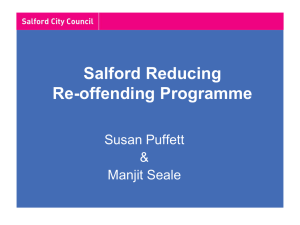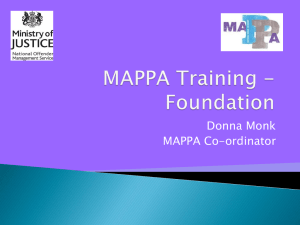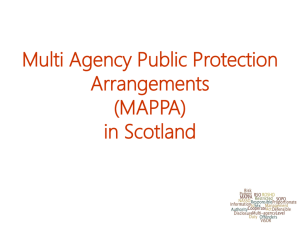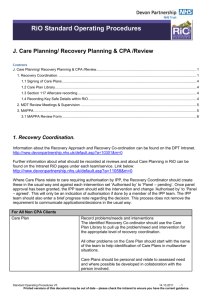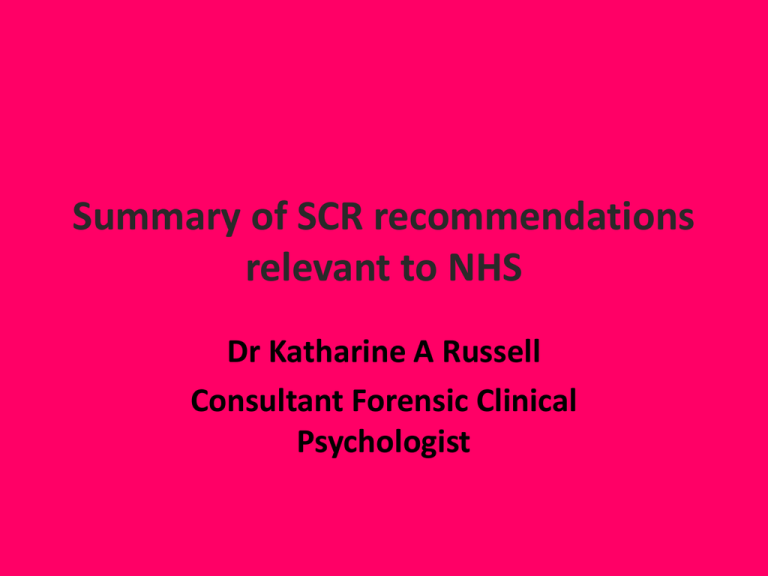
Summary of SCR recommendations
relevant to NHS
Dr Katharine A Russell
Consultant Forensic Clinical
Psychologist
SCRs included
•
•
•
•
•
Ryan Yates
Thomas Bennie Smith
Patrick Rea
Gavin Boyd
George Cameron
Ryan Yates
Ryan Yates (2012)
• 6.13 From the case files there does not appear to be any Health
representative from NHS Grampian at any risk management case
discussions or MAPPA meetings, despite XXXXXX. This would/could
provide both a vital avenue to share information and offset any potential
risks to health professionals. It is noted by the Review Team that XXXX
health needs were managed effectively by SPS during his period in
custody.
• 6.14 It would be reasonable to assume that XXX would require to attend a
GP surgery regularly however there is no mention made of how this would
be managed post release and how appropriate information would be
shared within NHS Grampian to address the risks posed to staff and
patients XXX may come into contact with. This would normally be
recorded within an offender’s risk management plan.
• 6.15 It would appear that there is no MAPPA representative or ‘Lead
Person’ within MAPPA for NHS Grampian currently and there is no strategy
or protocol in place at this time.
• 6.16 XXXXX
• 6.17 XXXXX
Ryan Yates (2012)
• Recommendation 1: NHS Grampian appoints a lead
person for MAPPA to ensure coordinated approach
and single point of contact for all other relevant
agencies.
• Recommendation 2: NHS Grampian develops a
MAPPA Health strategy/process to ensure
appropriate channels for information sharing,
attendance at relevant meetings and management of
associated risk for health services.
Thomas Bennie Smith
Thomas Bennie Smith (2011)
•
•
•
•
•
Managed at Level 1 (possibly a mistake)
Was seen by GP for anger issues, groin rash
Requested to see female only GP
GP not aware he was an RSO
Author of SCR concerned that information
sharing protocols not good enough as
potential opportunities had been missed in
this case regarding health passing on
information
Thomas Bennie Smith (2011)
Thomas Bennie Smith (2011)
Thomas Bennie Smith (2011)
• It is recommended that the Scottish Government in
consultation with NHS Health Boards undertake to
examine the feasibility of an alert system for the NHS
in Scotland, allowing for pro-active, real time
information sharing with the other “responsible
authorities” and” duty to co-operate agencies”
responsible for the management of sex offenders
(recommendation 12);
• Some of the issues highlighted included: the scope
for NHS to be considered as a responsible agency as
opposed to a duty to co-operate agency;
Patrick Rea (2012)
Gavin Boyd
Gavin Boyd (2012)
• INFORMATION SHARING
• It is recommended that South Ayrshire
Council and the State Hospital further
consider the issues highlighted in this review
in terms of information sharing and record
keeping.
Gavin Boyd (2012)
RISK ASSESSMENT
• It is recommended that the Scottish Prison Service
and NHS Scotland via the Forensic Network
consider conducting a review of the required
forensic psychological services and clinical forensic
psychological services for high risk registered sex
offenders to ensure appropriate offender and/or
clinical assessments and interventions prior to and
following release from prison
Gavin Boyd (2012)
RISK MANAGEMENT
• It is recommended that NHS Ayrshire and Arran
reviews arrangements for advising other MAPPA
partners about the targeting of other clinical
psychology services where clinical needs/issues are
identified in the management of high risk sex
offenders. This should also include clarity as to the
responsibility retained by NHS to seek/acquire that
provision
George Cameron (2013)
RECOMMENDATION 7
• It is recommended that Police Scotland considers including
an input on the Offender Management Course to give police
officers theoretical knowledge of why individuals sexually
offend and what relevant behaviours and traits may be
displayed by the sex offenders they manage.
RECOMMENDATION 8
• It is recommended that Police Scotland considers developing
a specific training course for supervisors working in the field
of offender management which at a minimum considers
how the welfare needs of officers in this area of work are
supported and further considers the input of other
professionals in developing / delivering this course
George Cameron (2013)
RECOMMENDATION 10
• It is recommended that all agencies involved in the MAPPA
process across the Glasgow CJA area ensure that in future all
decisions they are involved in concerning risk assessment and risk
management are clearly recorded and that there is supporting
documented evidence recorded to explain the justification for any
risk level been applied to an offender (this being mandatory
where a risk level is first set or where a decision is subsequently
taken to increase or decrease a previous risk level).
RECOMMENDATION 11
• It is recommended that all agencies involved in the MAPPA
process across the Glasgow CJA area ensure that in future the risk
management plan relating to an offender is explicit about what
risk factors apply to that offender. The risk management plan
must detail actions necessary to address the risk factors
associated with the offender and the risk management plan must
make it clear how the actions on the RMP to manage the offender
in the community link to each of the risk factors identified.
Summary
• Key points are:
– Health rep attendance at MAPPA
– Information sharing is an issue
– Specifically communication with GPs has arisen as a
problematic area
– Highlighting that there are critical gaps in knowledge
about risk assessment in some MAPPA agencies, police in
particular. Health professionals have this expertise and
can therefore contribute to MAPPA – areas of need in
training but also in terms of input into MAPPA risk
assessment
Summary #2
• Staff in MAPPA agencies require supervision and
support when working with very difficult cases.
• Specific mention of psychology providing
assessment and potentially intervention for high
risk offenders
• Record keeping is an issue – How do we create and
store records for MAPPA cases? If input is
consultancy only then how is this recorded?
• Does NHS need better alert system? Are Health
staff in general aware of how to handle alerts and
how to cope with an RSO in their service?

